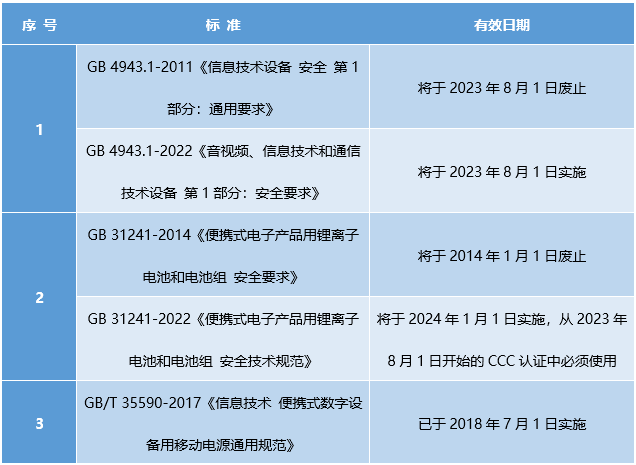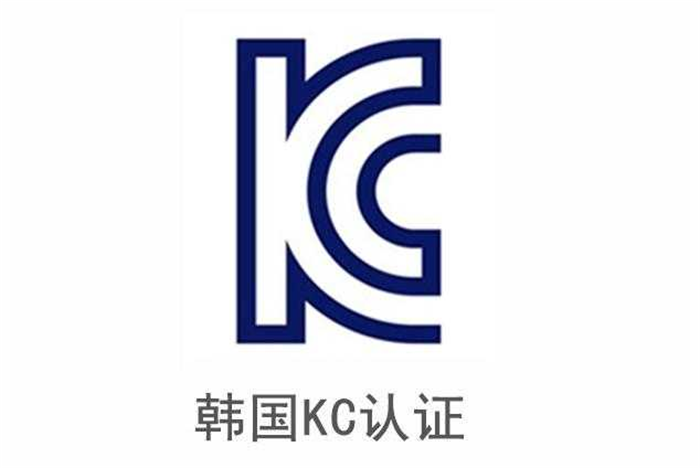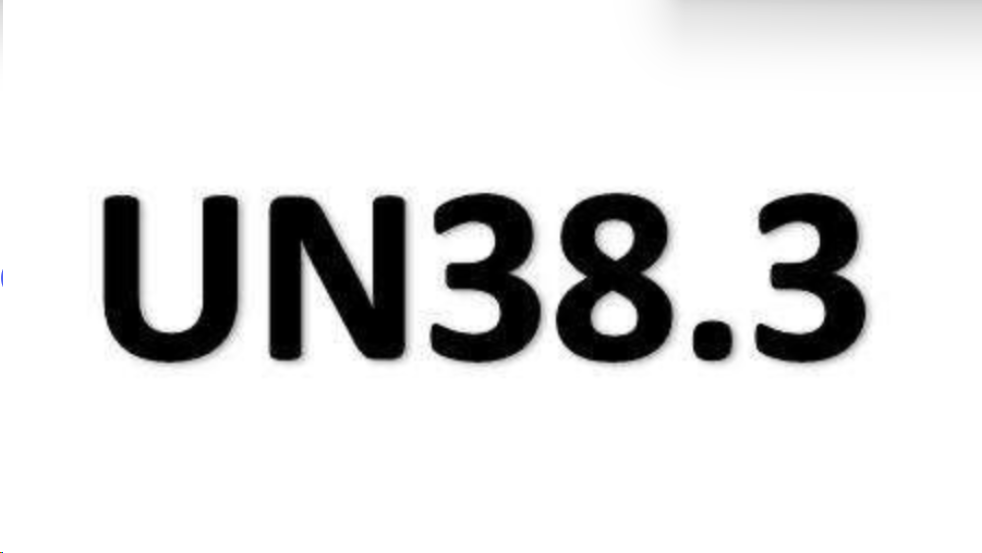Mobile Power Pack (MPP), also known as a power bank, is a portable charger that integrates power supply and charging functions to charge mobile phones, tablets and other digital devices anytime and anywhere. It is generally a portable power supply with a mass of not more than 18kg, containing a lithium-ion battery and/or battery pack, and having an AC/DC input/output for easy and quick use. However, when the mobile power supply encounters collision, extrusion, high temperature and other conditions, it is easy to cause smoke and fire caused by internal short circuit of lithium battery.
In order to ensure the quality and safety of the mobile power supply, the mobile power supply before entering the market needs to be tested and certified by an authoritative third-party inspection and certification body. Applicable standards for mobile power supply include: GB 4943.1, GB 31241, GB/T 35590 and so on; Among them, GB 4943.1-2022 and GB 31241-2022 will be adopted for CCC certification of mobile power supply. Since mobile power products are in the preparatory period of CCC product certification and the transition period of product standard switching, the product standards implemented can be referred to the following table:

Mobile power supply CCC certification notice
1. According to the provisions of the Announcement of the State Administration for Market Regulation on the Implementation of Compulsory Product Certification Management for lithium-ion batteries and other products (No. 10, 2023) : Since August 1, 2023, the designated certification body began to accept the CCC certification of mobile power products, in accordance with the "Mandatory Product certification Implementation Rules Information Technology Equipment" and the applicable standards listed in the annex to carry out certification work; Since August 1, 2024, those without the CCC certification certificate and the certification mark shall not be allowed to leave the factory, sell, import or use in other business activities. Mobile power CCC testing laboratory list, is expected to be announced in June.
2. According to the annex definition table of the Announcement of the State Administration for Market Regulation on the implementation of Mandatory Product Certification Management for lithium-ion batteries and other products (No. 10, 2023), mobile energy storage power with a mass of less than 18kg needs to be certified by CCC.
3, according to the "State Administration for Market Regulation on lithium ion batteries and other products to implement mandatory product certification management notice" (2023 No. 10) article 4 "designated certification bodies and laboratories should be in the certification risk controllable, ensure the quality of certification under the premise, actively adopt the existing conformity assessment results, reduce the burden of enterprises, facilitate enterprises to obtain certification. Has obtained the mobile power CQC voluntary certification report want to change into CCC mandatory certification report, later supplement the difference test can be.
Common problems and solutions in mobile power testing
1. The fire test of the mobile power supply housing is not passed
◆ When customizing the purchase of shell, customize in line with GB4943.1 or UL 94 or GB/T 5169.16 standard V-0 flame retardant shell;
◆ If the factory homemade shell, it is necessary to add enough flame retardant in the raw materials, and according to the relevant standards for testing and verification (it is best to customize the purchase, trial shell sample sent to the laboratory test, meet the flame retardant grade requirements, and then mass production);
If the housing is constructed of multiple materials, each material must meet V-0 flame retardant rating requirements.
2. The heat abuse test of the mobile power supply fails
Heat abuse test is to place the internal battery of the mobile power supply in a high temperature environment of 130 ° C for 30 minutes to see whether the battery will fire or explode at the ambient temperature. Therefore, it is necessary to pay attention to whether the battery can withstand the high temperature of 130℃ during the test, especially the internal electrolyte. If the electrolyte is decomposed at this temperature and produces a large amount of gas, the battery will quickly bulge, crack and easily cause fire. It is suggested that manufacturers avoid quality problems of lithium batteries from the procurement link, such as:
◆ Enterprise import GB 31241 standard system, strengthen management in the procurement link, incoming material inspection link;
◆ If you purchase lithium ion batteries without CCC certification during the transition period, you are required to provide the list of raw materials, specifications, test reports in line with GB31241 standards, etc.
Strengthen incoming material inspection and inspection, if necessary, can entrust the third party testing institutions to carry out commissioned testing.
3. The output capacity of the mobile power supply is not up to standard
◆ Grasp the actual capacity of the internal lithium battery, and on the basis of mastering the label (can not only rely on the battery claim, nominal label, avoid not close to the actual appearance of false label);
Optimize the protection circuit of the mobile power supply to reduce the energy loss caused by overheating in the work of the mobile power supply;
◆ Test the actual capacity value after the production of the machine, and consider the long-term placement or charge and discharge loss, in the master of a large number of actual data mark a relatively conservative capacity value (the standard requirement is the actual capacity of the product to mark the capacity).
4. The conversion efficiency of the mobile power supply is less than 80% (conversion efficiency = the output energy of the whole machine/the energy of the internal battery pack)
The conversion efficiency of the whole machine is investigated. If you can ensure that the conversion efficiency of the whole machine is above 80%, you can not mark the conversion efficiency value on the product; If you can not ensure that the conversion efficiency of the whole machine is more than 80%, you can mark a relatively safe conversion efficiency value on the product or the outer package or the manual according to the actual conversion efficiency (to ensure that the measured value can be greater than the marking value).
Documents required for applying for CCC certification for mobile power supplies
1, compulsory product certification application;
2. Application for certified product instruction in Chinese;
3. Product assembly drawing and electrical schematic diagram;
4. Process flow chart of certified products (provided for initial application or change);
5. List of key instruments and equipment for routine inspection (see Certification implementation rules, factory quality control testing requirements) (provided at the time of initial application or change);
6. Organization chart of the production plant (provided for initial application or change);
7. Chinese nameplate and warning mark for certified products (in duplicate);
8. Copy of the Business License of Enterprise Legal Person or registration certificate of the applicant (provided at the time of initial application or change);
9. Description of the differences between different types of products in the same application unit;
10. Appearance photos of each type of product in the same application unit (in duplicate);
Other relevant information required when necessary (if there is a CB test report, please provide).
Mobile power supply CCC certification process
1. Application is accepted
After CQC application is accepted successfully, CQC will send a notice of acceptance to the applicant, informing the applicant to send or send relevant documents and materials.
2. Data review
The CQC reviews the applicant's data and informs the applicant to send samples to the testing facility.
3. Receive the samples submitted
The applicant sends the sample to the designated testing institution. After sample acceptance, the testing institution fills in the sample testing progress table and reports it to CQC, and the sample testing officially begins.
4. Sample test
After the sample test, the testing institution will send the test report and other data to CQC.
5. Factory review
For applications requiring a factory review, the Inspection Office organizes a factory review.
6. Conformity assessment
The CQC certified engineer makes a preliminary assessment of the applicant's tasks. The above results will be reviewed by qualified assessors.
7. Certificate approval
CQC issues the certificate.
8. Printing, receiving, sending and managing certificates
The applicant shall manage the certificate according to relevant requirements after receiving it.
Warm tips
ZRLK 18 years focus on battery and consumer products testing and certification, always pay attention to the changes in national regulations, to provide customers with one-stop testing and certification services, to ensure that your products quickly enter the target market. If you want to know more about the requirements of battery and consumer products testing and certification or battery and consumer products need to handle relevant testing and certification, please feel free to contact us, our engineers will serve you in the first time!


![[Holiday Notice] ZRLK 2026 Chinese New Year Holiday Schedule](/uploads/image/202602/698559be66d97.jpg)










